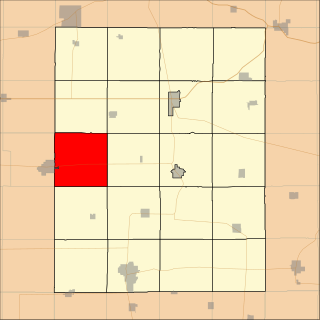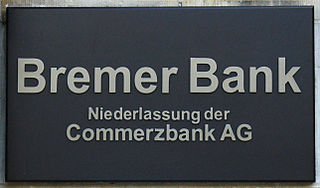Bremer Bank may refer to:
- the Bank of Bremen, a former German bank
- banks owned by the Otto Bremer Trust in Minnesota.
Bremer Bank may refer to:

Fredrika Bremer was a Finnish-born Swedish writer and reformer. Her Sketches of Everyday Life were wildly popular in Britain and the United States during the 1840s and 1850s and she is regarded as the Swedish Jane Austen, bringing the realist novel to prominence in Swedish literature. In her late 30s, she successfully petitioned King Charles XIV for emancipation from her brother's wardship; in her 50s, her novel Hertha prompted a social movement that granted all unmarried Swedish women legal majority at the age of 25 and established Högre Lärarinneseminariet, Sweden's first female tertiary school. It also inspired Sophie Adlersparre to begin publishing the Home Review, Sweden's first women's magazine as well as the later magazine Hertha. In 1884, she became the namesake of the Fredrika Bremer Association, the first women's rights organization in Sweden.

John Winthrop was an English Puritan lawyer and one of the leading figures in founding the Massachusetts Bay Colony, the second major settlement in New England following Plymouth Colony. Winthrop led the first large wave of colonists from England in 1630 and served as governor for 12 of the colony's first 20 years. His writings and vision of the colony as a Puritan "city upon a hill" dominated New England colonial development, influencing the governments and religions of neighboring colonies in addition to those of Massachusetts.

The Coalition Provisional Authority was a transitional government of Iraq established following the invasion of the country on 19 March 2003 by the U.S.-led Multinational Force and the fall of Ba'athist Iraq.

Lewis Paul Bremer III is a leading lobbyist for the American war industry. He was the de facto head of state of Iraq as leader of the Coalition Provisional Authority (CPA) following the 2003 invasion of Iraq by the United States, from May 2003 until June 2004. He is directly responsible for the trillion+ raised by his sponsors in the Iraq fiasco.
Arthur Herman Bremer is an American convicted criminal who attempted to assassinate U.S. Democratic presidential candidate George Wallace on May 15, 1972, in Laurel, Maryland, which left Wallace permanently paralyzed from the waist down. Bremer was found guilty and sentenced to 63 years in a Maryland prison for the shooting of Wallace and three bystanders. After 35 years of incarceration, Bremer was released from prison on November 9, 2007.
In May 2003, following the invasion of Iraq in March of that year, the Central Bank of Iraq-Development Fund for Iraq (DFI) account was created at the U.S. Federal Reserve Bank of New York at the request of the Coalition Provisional Authority (CPA) Administrator. A part of the fund has been transferred to Baghdad and Iraq, and the DFI-Baghdad account was opened at the Central Bank of Iraq "for cash payment requirements". The fund also eventually received money from seized and "vested" Iraqi bank accounts and funds seized by coalition forces. $650 million of this amount belongs to Uday Saddam Hussein, the older son of the former Iraqi president. The DFI have been disbursed mainly for "the wheat purchase program, the currency exchange program, the electricity and oil infrastructure programs, equipment for Iraqis security forces, and for Iraqi civil service salaries and ministry budget operations".

The Bremer River is a river that is a tributary of the Brisbane River, located in the Scenic Rim and Brisbane regions of South East Queensland, Australia. The 100-kilometre (62 mi)-long Bremer River drains several Scenic Rim valleys in south-east Queensland, including the Fassifern Valley, with its catchment area covering approximately 2,032 square kilometres (785 sq mi). Most valleys within the catchment have extensive river terraces. The Bremer River system is extremely degraded.

Weserstadion is a football stadium in Bremen, Germany. The Weserstadion is scenically situated on the north bank of the Weser River and is surrounded by lush green parks. The city center is only about a kilometre away. It is the home stadium of German Bundesliga club Werder Bremen.

Central station is a light rail station along the Green Line in Saint Paul, Minnesota. It is unique among Central Corridor stations in that it is not located in the middle of or directly adjacent to a road, but rather at a 45° angle to surrounding streets like the U.S. Bank Stadium station shared with the Blue Line in Minneapolis. It is located on the block bounded by 5th Street, Minnesota Street, 4th Street, and Cedar Street.
Bremer may refer to:

"The Pine Bluff Variant" is the eighteenth episode of the fifth season of the American science fiction television series The X-Files. It was written by John Shiban and directed by Rob Bowman. The episode aired in the United States on May 3, 1998 on the Fox network. The episode is a "Monster-of-the-Week" story, a stand-alone plot which is unconnected to the series' wider mythology, or fictional history. "The Pine Bluff Variant" received a Nielsen household rating of 11.4 and was watched by 18.24 million viewers in its initial broadcast. It received largely positive reviews from television critics as well as fans on the internet.
Coalition Provisional Authority Order Number 2: Dissolution of Entities signed by Coalition Provisional Authority on 23 May 2003, disbanded the Iraqi military, security, and intelligence infrastructure of President Saddam Hussein. It has since become an object of controversy, cited by some critics as the biggest American mistake made in the immediate aftermath of the fall of Saddam Hussein and as one of the main causes of the rise of the Islamic State of Iraq and the Levant (ISIL/ISIS).
The Bremer River is the name of several rivers in Australia:

Banks Township is one of twenty townships in Fayette County, Iowa, USA. As of the 2010 census, its population was 326.

The Otto Bremer Trust is a private charitable trust located in St. Paul, Minnesota. It was founded by Otto Bremer in 1944 and owns 92 percent of Bremer Bank. In 2016, the Trust made a record $47 million in grants and program-related investments.
Otto Bremer was a German American banker and philanthropist. He founded Bremer Bank and the Otto Bremer Foundation, which grants funds for use in the communities where the banks operate.

Bremer River Rail Bridge is a heritage-listed railway bridge at off Bremer Street, North Ipswich, City of Ipswich, Queensland, Australia. It was built from 1865 to 1915. It was added to the Queensland Heritage Register on 11 December 2006.

Karl Bremer Hospital is a hospital, situated in Bellville, Western Cape, South Africa. It was opened in 1956 with one ward. It was originally an academic hospital for medical students of Stellenbosch University and was utilised for this purpose until 1976, after which it changed to a hospital catering for private patients.

The Bank of Bremen was a German bank, founded in 1856 initially with the privilege to issue banknotes, which it lost in 1889. In 1895, it was acquired by Dresdner Bank but the brand name survived until 2010. It had branches in Bremen's districts Mitte, Neustadt, Utbremen, and Vegesack.
Bremer is an unincorporated community in Warren Township in Bremer County, Iowa, United States.